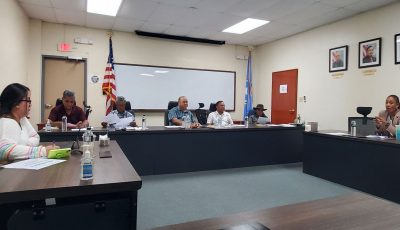IPI’s abandoned workers
“Injustice anywhere is a threat to justice everywhere. We are caught in an inescapable network of mutuality, tied in a single garment of destiny. Whatever affects one directly, affects all indirectly.”
—Martin Luther King, Jr.
My House colleagues and I spent Martin Luther King Jr. Day visiting with dozens of stranded Imperial Pacific International workers who are living in three company-owned housing facilities in Sadog Tasi (Vestcor), Garapan (Queen’s), and the Chalan Laulau dormitories.
We also spent time talking with workers at each of the sites, and listening to their worries and frustrations. They have been all but abandoned by IPI—no pay for months, many for nearly a year, with no word at all on when they will be able to return to their home countries. And they are living in deplorable conditions.
The residents at Vestcor and Queen’s have had no power for weeks. When we visited on Monday afternoon, we found many sitting outside because it was so hot indoors. Queen’s lacked running water as well, and workers there have been manually fetching water from a poorly maintained catchment tank located on the roof. “The water is dirty,” they told us. “It’s only for flushing toilets. Not for cooking.” If they bathed in that water, they said, they get “itchy.” There is a generator, but it only runs four hours a day, and it only powers half the building.
Up until several weeks ago, the Vestcor residents also had a generator providing limited power to their apartment units. Then the generator broke down. It has yet to be fixed. IPI management is now pressuring the residents to move to another housing facility that is in even worse condition than Vestcor—no utilities there either, and zero maintenance for over a year. “The bushes are so high,” they said. “There’s mold on the walls and beds.” The other “option” IPI gave them was to move to another apartment complex where they would be responsible for their own utilities. “But how?” they asked. They have no money.
Sometime last week, the water stopped running at Vestcor too. IPI management told them a truck would come to deliver water to replenish the tank. But no truck came. After days of no water and having no ability to bathe, flush toilets, or clean their homes, several IPI workers tracked their water pipes to the tank and discovered that “someone” had deliberately turned off the valve. They believe IPI management did it —to make conditions so unbearable that they would all just leave. The workers opened the valve and water began to flow again to their apartments.
This would not be the first time we have heard allegations of hostile acts by IPI management—at the Chalan Laulau dorms, we were told that generator power and running water were only provided to the units occupied by Taiwanese workers, and totally cut off to the units occupied by the Turkish workers. It was the Turkish workers who had staged protests and filed a labor lawsuit against the company. IPI eventually restored utilities to Chalan Laulau after being hauled into federal court and visited by casino commission investigators. The company’s neglect continued in other ways, however. When we stopped by the dorms on Monday, we found trash overflowing in the bins outside, and the Turkish workers had been out of drinking water for nearly three days.
IPI’s abandoned workers are skilled men and women who come from all over the world—Turkey, Taiwan, Malaysia, Italy, Australia, the Philippines. Many have worked overseas before, in many other countries throughout Europe, Africa, Asia, the Middle East. Many said this was the first time they have been so utterly forsaken by an employer. They wondered how this could happen on U.S. soil. They were shocked at how slow the government has been to help them. They came to the Marianas with the promise of decent jobs that would allow them to support their families. But now their families are sending them money.
Most workers said they just want to get paid what they are owed and return to their countries. Some have visas that expire at the end of the month. Some have already fallen out of legal status and worry about being deported and barred from reentry and future opportunities to work in the United States.
Again and again, their efforts to get answers from IPI have ended in frustration. The Human Resources office is closed, they said, and unresponsive. IPI “management” seems faceless, nameless, unreachable, wreaking havoc on their lives. “They lie to us all the time,” the workers said. Many of their compatriots who left island months ago—some purchased their own tickets—still have not been paid as promised. The workers who remain here are fearful they will suffer the same fate.
Their stories are heartbreaking. The workers who remain are among the thousands who have experienced abuse, unpaid wages, and inhumane living conditions since the inception of this supposed multibillion-dollar casino project on Saipan.
The government has failed these people profoundly, and the wheels of justice turn too slowly. What is somewhat different now is that local legislators in the new leadership are paying attention to the plight of IPI’s stranded workers. We are also examining the failures of governance that have allowed IPI to get away with flagrant violations of laws, regulations, and contractual obligations for so long.
Even now, IPI is allowed to continue construction in Garapan, though its workers and safety inspectors haven’t been paid for months. Even now, IPI owes millions in taxes, license fees, regulatory fees, Community Benefit Fund obligations, and vendor payments, yet still retains its gaming license and many of its assets. Even now, the administration claims to be enforcing the law and holding IPI accountable—despite years of evidence to the contrary.
On this MLK Day, I am reflecting on how we can all be of service in some way, however small, to share compassion, offer relief, and make life a little more bearable to others in need. I am grateful to live in our kind and generous island community. I am thankful for caring colleagues. And I am pondering the mountain of work that lies ahead to make the Northern Marianas a place where workers’ rights are respected and defended, where the government moves quickly to protect the abused, where justice and the rule of law prevail.
***
Christina-Marie E. “Tina” Sablan is a member of the CNMI House of Representatives representing Precinct 2 in the 22nd Legislature. She chairs the Health and Welfare Committee and is vice chair of the Gaming Committee.



























